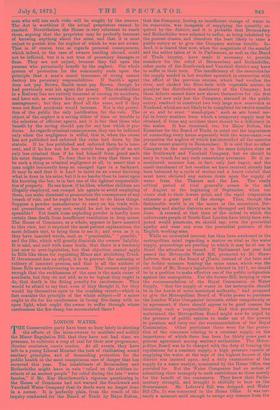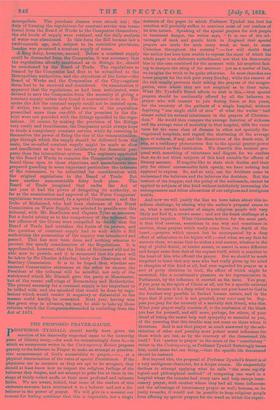LONDON WATER.
that the Company, having an insufficient storage of water in its reservoirs, was incapable of supplying the quantity re- quired by the district, and it is probable that Bermondsey and Rotherhithe were selected to suffer, as being inhabited by the poorest classes, and therefore the least likely to raise a public outcry or to give the Company serious trouble. In- deed, it is feared that now, when the magnitude of the scandal and the notice taken of it in Parliament, as well as the Beard of Trade inquiry, have made it necessary to provide somehow for the relief of Bermondsey and Rotherhithe, other parts of the Southwark and Vauxhall district may have to suffer in their turn. The insufficiency of the reservoirs for the supply needed in hot weather operated, in connection with the effect of the previous storms, which had swollen the river, and choked the filter-beds with vegetable matter, to paralyse the distributive machinery of the Company ; but these defects cannot have now shown themselves for the first time, yet now only has the Company, alarmed at the public outcry, resolved to construct two very large new reservoirs at Nunhead, which are not likelyto be completed for twelvemonths or so, and to erect " stand-pipes," such as are found, use- ful in frosty weather, from which a temporary supply may be obtained, if from any accident there should be a deficiency in the mains. It has remained, too, for Major Bolton, the Examiner for the Board of Trade, to point out the importance of connecting every house separately with the water-main,—a precaution the neglect of which has intensified all the miseries of the recent scarcity in Berthondsey. It is said that no other Company in the metropolis is in the same helpless state as the Southwark and Vauxhall Company, but we should be sorry to vouch for any such consolatory averment. Be it re- membered, summer has, in fact, only just begun, and the small instalment of hot weather we have received already has been balanced by a cycle of storms and a heavy rainfall that must have obviated any serious drain upon the supply of water from the Thames and the Lea. The really critical period of trial generally comes in the end of August or the beginning of September, when our rivers sink to their lowest point, and the rapid evaporation exhausts a great part of the storage. Then, though the fashionable world is on the moors or the mountains, Ber- mondsey and similar districts are as thronged and thirsty as in June. A renewal at that time of the ordeal to which the unfortunate people of South-East London have lately been sub- jected would penetrate, we should say, even the proverbial apathy and wear out even the proverbial patience of the English working-man.
While an unwonted interest has thus been awakened in the metropolitan mind regarding a matter, so vital as the water supply, proceedings are pending to which it may be of use to direct the attention so roused. If Parliament last year had passed the Metropolis Watdi. Bill, promoted by Mr. Shaw- Lefevre, then at the Board of ;Trade, instead of the later and far feebler measure bearing' the same name, which was the sole fruit of Mr. Bruce's legislative labours in 1871, we should be in a position to make effective use of the public indignation against the monopolists. For the former Bill, keeping in view the recommendation of the Royal Commission on Water Supply, " that the supply of water in the metropolis should be in the hands of some municipal authority," had proposed to give the Metropolitan Board of Works power to purchase the London Water Companies' interests, either compulsorily or by agreement, if there should appear to be good reasons for incurring such a responsibility. Had this provision been maintained, the Metropolitan Board might now be urged by the pressure of public opinion to make use of the powers in question, and carry out the recommendation of the Royal Commission. Other provisions there were for the protec- tion of the consumer relating to a constant supply, on the importance of which there has been for thirty years past a general agreement among sanitary authorities. The Metro- politan Board was to be charged with the duty of framing the regulations for a constant supply, a high pressure capable of supplying the water at the tops of the highest houses of the district was insisted upon, and a daily examination of the supply by a water analyst, nominated by the Home Office, was provided for. But the Water Companies had no notion of submitting their monopoly to such restrictions as these merely for the benefit of the consumers. They knew their Parlia- mentary strength, and brought it skilfully to bear on the Government. Mr. Lefevre's Bill was dropped, and Water Bill (No. 2) was concocted in the Home Office. It was cer- tainly a measure mild enough to escape any censure from the
monopolists. The purchase clauses were struck out ; the duty of framing the regulations for constant service was trans- ferred from the Board of Works to the Companies themselves ; the old levels of supply were retained, and the daily analysis in imminent danger, the writer says, " It is one of the ad- of water was abandoned. In this form the Bill became law a vantages of rank and gentle birth in England that special twelvemonth ago, and, subject to its restrictive provisions, prayers are made for such every week at least, in most London was promised a constant supply of water. Churches throughout the country " :— few will doubt that
Aging delay, however, ensued. Before a constant supply the author has here been unable to repress the sneer of which his could be demanded from the Companies, it was necessary that whole paper is an elaborate embodiment, nor that his democratic the regulations already mentioned as to fittings, &c., should bias in this case combined for the moment with his sceptical feel- be sanctioned by the Board of Trade. The regulations as ing to sharpen the sting of his sentence : yet as a matter of fact, framed by the Companies had first to be submitted to the we imagine the truth to be quite otherwise. In most churches one Metropolitan authorities, and the objections of the latter—the hears prayers for the sick poor every Sunday, while the reserve of Board of Works and the Corporation of the City—against the rich usually prevents their asking the prayers of the congre- them had to be received and considered. On examination it gation, even where they are not sceptical as to their value.
prayer who will consent to join during three or five years, under the Act the constant supply could not be insisted upon, for the recovery of the patients of a single hospital, without if within two months after the service of the requisition depriving "one single child of man" of what the writer " had prescribed more than one-fifth of the premises in the dis- trict were not provided with the fittings specified in the regu- dom." He would then compare the average duration of sickness lawns. Of course, by making the provision of the fittings and the average rates of mortality in that hospital, with the same very costly and troublesome, the Companies could always hope ratesfor the same class of diseases in other not specially dis- to evade a compulsory constant service, while by reserving to themselves the power of fixing the size of the communication- I tinguished hospitals, and regard the shortening of the average appeared that the regulations, as had been anticipated, were devised to save the Companies from the necessity of giving a constant supply unless they found it convenient to do so. For
pipe through which the supply should be delivered from the main, the so-called constant supply might be made so slow and insufficient as to be less satisfactory for domestic pur- poses than the intermittent system. The engineers appointed by the Board of Works to examine the Companies' regulations found them open to these objections, and amendments were prepared guarding in some important particulars the interests of the consumers, to be submitted for consideration with the original regulations to the Board of Trade. But here another unaccountable delay took place. The Board of Trade imagined that under the Act of last year it had the power of delegating its authority, so far as the examination and approval of the Water Companies' regulations were concerned, to a special Commission ; and the Duke of Richmond, who had been chairman of the Royal Commission on Water Supply, was selected to preside over this tribunal, with Mr. Rawlinson and Captain Tyler as assessors. But a doubt arising as to the competency of the tribunal, the law officers of the Crown were compelled to decid that the Board of Trade had mistaken the limits of its powers, and the question of constant supply had to wait while a Bill authorising the prosecution of the inquiry was introduced and passed. This has now been done, and nothing remains to prevent the speedy consideration of the Regulations. It is apprehended, however, that the Duke of Richmond will not be able now to preside, and it is rumoured that his place will be taken by Sir Charles Adderley, lately the Chairman of the Sanitary Commission. It is to be hoped that, whether one eminent Conservative statesman or the other be chosen, the President of the tribunal will be mindful, not only of the watchword which Mr. Disraeli gave the party at Manchester, but of the recent sufferings of Bermondsey and Rotherhithe. The proved necessity for a constant supply is too important to be trifled with, and the mischief that would be done by regu- lations which would render it nugatory or distasteful to the masses could hardly be overrated. Next year, having won this great step in advance, we may be able to take up those reforms which the Companies succeeded in excluding from the Act of 1871.



































 Previous page
Previous page